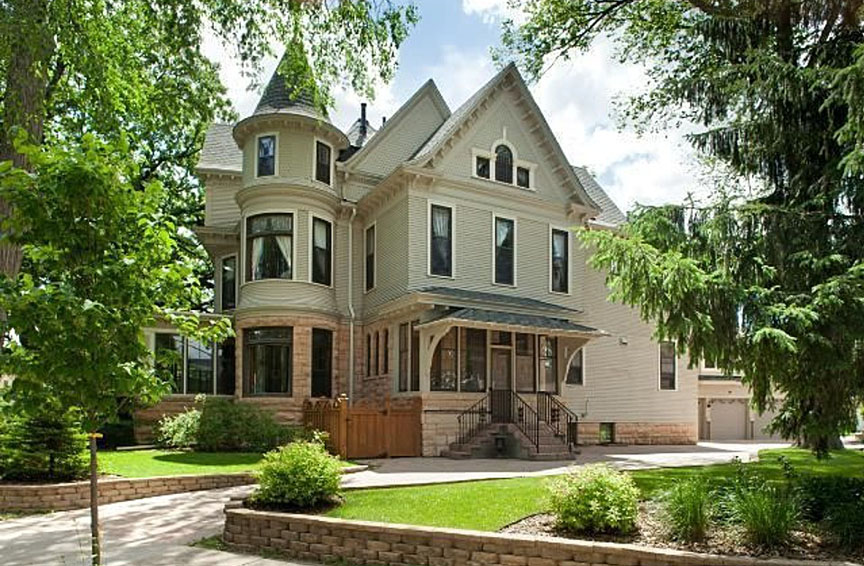Spencer E. Davis was born in Cazenovia, New York on March 30, 1841. His parents were Edmund and Ada (Curtis) Davis. In 1861, at the age of 20, he enlisted in the Union Army, 114th Regiment of the New York Volunteers. In 1866 he moved to Horicon, Wisconsin, and became superintendent of the May-ville Iron Works. In 1870 he entered into partnership with W. A. Van Brunt under the name Van Brunt & Davis, capitalized at $1,300. The business was successful and was incorporated as the Van Brunt & Davis Company, with a capital stock of $100,000. The business manufactured farm implements and was known as the Monitor Manufacturing Company. In 1891 Davis purchased the interest of Van Brunt.
In 1892 T. B. Walker paid Davis a bonus to move the plant to St. Louis Park. The business was incorporated under the name of the Monitor Manufacturing Company and the capital stock increased to $200,000. In 1902 the company was reorganized as the Monitor Drill Company, and the capital stock was increased to $1 million. Davis actively managed the company until 1908, when he “disposed of his interest to the officers of the Moline Plow Company” and retired.
One of his biographers has said concerning his business career:
Mr. Davis took a great deal of pride in the friendly relations which always existed between himself and his employes. At the time of his retirement from business in. 1908, there were a number of men employed in the factory at St. Louis Park who had been with him continuously since he first engaged in business. These men Mr. Davis regarded as his personal friends and the regard was mutual. From the day he started in business until he retired, he never, for any reason, skipped a payday or postponed payment of his employes’ wages. In 1903, to show his appreciation of long service, Mr. Davis distributed among the employes who had been with him for a certain number of years, a gift of between twenty-five thousand and thirty thousand dollars, which took the form of a bonus, the amount being decided by the terms of service. He was a man who took great pride in looking after the interests of his workmen and seeing that their rights were fully protected. Mr. Davis was an advocate of the open shop principle, believing that a workman’s wages should be governed by his ability, rather than by an arbitrary scale fixed by parties unfamiliar with the facts and circumstances under which the work man was employed. He delighted in paying high wages to men of ability, but was unalterably opposed to paying incompetent men the same wages as those possessing skill and experience. He also believed that the incompetent man should not set the scale of wages for the skillful mechanic, nor that an average should be struck which reduced the pay of the highly skilled workman and increased the compensation of the incompetent. He believed that the employer not only should maintain an open shop but in case where union laborers were employed and there was a strike that he should be loyal to those who came to him as employes at such a time and that with the settlement of the strike such men should not be forced to lose their positions or to have to stand oppression and opposition of strikers who were reemployed. He felt that when all employers would be loyal and faithful to those who came to them as strikebreakers that the conditions of capital and labor would be largely solved and he proved the correctness of his vision in his own establishment, following out the policy that he advocated for others. He was always fair and just, believed in a good living wage and in the adequate return for skill and ability as opposed to incompetency.
Davis’s other business activities included service as secretary-treasurer of the Cottonwood Live Stock Company (sheep ranch) of Cody, Wyoming. He was also president and treasurer of the Davis Rice Company of Inez, Texas, owners of about three thousand acres of farmland.
Davis was a thirty-second degree Mason and was also a member of the Mystic Shrine, the Independent Order of Odd Fellows, the Benevolent Protective Order of Elks, and the Rawlins Post of the Grand Army of the Republic.
Davis married Alice M. Sherman on December 26, 1871, in Horicon, Wisconsin. Their son, S. Edmund Davis, was born in 1875 and died in 1903. Their daughter Phosa married E. R. Beeman of the Beeman Tractor Company of Minneapolis.
Davis had the home at 2104 Kenwood Parkway in Minneapolis built for him in 1892. This home became famous over 80 years later as the “Mary Tyler Moore House.”

The Davises wintered in California. He became ill in Pasadena and was on a special train on his way back to Minneapolis, but he died just as the train was pulling into Minneapolis, on April 4, 1913.
Source:
History of Minneapolis, Gateway to the Northwest; Chicago-Minneapolis, The S J Clarke Publishing Co, 1923; Edited by: Rev. Marion Daniel Shutter, D.D., LL.D.; Volume I – Shutter (Historical); volume II – Biographical; volume III – Biographical SPENCER E. DAVIS – Vol II, pg 506-509
